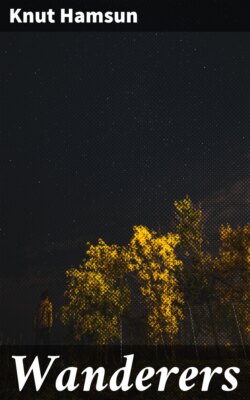Читать книгу Wanderers - Knut Hamsun - Страница 20
На сайте Литреса книга снята с продажи.
XIII
ОглавлениеTable of Contents
We tramped three days and found no work, but had to pay for our food and drink, getting poorer every day.
“How much have you got left, and how much have I got left? We'll never get any great way at this rate,” said Falkenberg. And he threw out a hint that we'd soon have to try a little stealing.
We talked it over a bit, and agreed to wait and see how things turned out. Food was no difficulty, we could always get hold of a fowl or so at a pinch. But ready money was the thing we really needed, and that we'd have to get. If we couldn't manage it one way, we'd have to manage another. We didn't set up to be angels.
“I'm no angel out of heaven alive,” said Falkenberg. “Here am I now, sitting around in my best clothes, and they no better than another man's workaday things. I can give them a wash in a stream, and sit and wait till they're dry; if there's a hole I mend it, and if I chance to earn a bit extra some day, I can get some more. And that's the end of it.”
“But young Erik said you were a beggar to drink.”
“That young cock. Drink—well, of course I do. No sense in only eating. … Let's look about for a place where there's a piano,” said Falkenberg.
I thought to myself: a piano on a place means well-to-do folk; that's where he is going to start stealing.
In the afternoon we came to just such a place. Falkenberg had put on my town clothes beforehand, and given me his sack to carry so he could walk in easily, with an air. He went straight up to the front steps, and I lost sight of him for a bit, then he came out again and said yes, he was going to tune their piano.
“Going to what?”
“You be quiet,” said Falkenberg. “I've done it before, though I don't go bragging about it everywhere.”
He fished out a piano-tuner's key from his sack, and I saw he was in earnest.
I was ordered to keep near the place while he was tuning.
Well, I wandered about to pass the time; every now and then coming round to the south side of the house, I could hear Falkenberg at work on the piano in the parlour, and forcibly he dealt with it. He could not strike a decent chord, but he had a good ear; whenever he screwed up a string, he was careful to screw it back again exactly where it was before, so the instrument at any rate was none the worse.
I got into talk with one of the farm-hands, a young fellow. He got two hundred Kroner a year, he said, besides his board. Up at half-past six in the morning to feed the horses, or half-past five in the busy season. Work all day, till eight in the evening. But he was healthily content with his life in that little world. I remember his fine, strong set of teeth, and his pleasant smile as he spoke of his girl. He had given her a silver ring with a gold heart on the front.
“And what did she say to that?”
“Well, she was all of a wonder, you may be sure.”
“And what did you say?”
“What I said? Why, I don't know. Said I hoped she'd like it and welcome. I'd like to have given her stuff for a dress as well, but. …”
“Is she young?”
“Why, yes. Talk away like a little jews' harp. Young—I should think so.”
“And where does she live?”
“Ah, that I won't say. They'd know it all over the village if I did.”
And there I stood like another Alexander, so sure of the world, and half contemptuous of this boy and his poor little life. When we went away, I gave him one of my rugs; it was too much of a weight to go carrying two. He said at once he would give it to his girl; she would be glad of a nice warm rug.
And Alexander said: If I were not myself I would be you. …
When Falkenberg had finished and came out, he was grown so elegant in his manners all at once, and talked in such a delicate fashion, I could hardly understand him. The daughter of the house came out with him. We were to pass on without delay, he said, to the farm adjacent; there was a piano there which needed some slight attention. And so “Farvel, Frøken, Farvel.”
“Six Kroner, my boy,” he whispered in my ear. “And another six at the next place, that's twelve.”
So off we went, and I carried our things.
